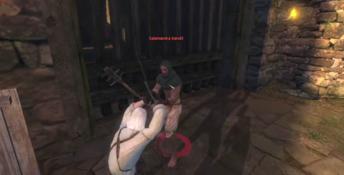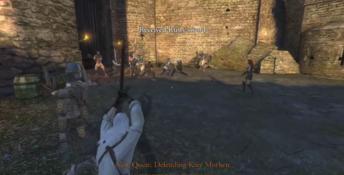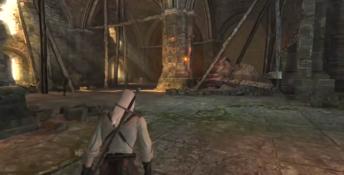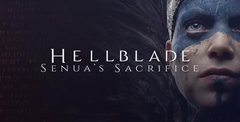The Witcher

| a game by | CD Projekt RED |
| Platform: | PC (2007) |
| Editor Rating: | 8/10, based on 1 review, 5 reviews are shown |
| User Rating: | 8.0/10 - 3 votes |
| Rate this game: | |
| See also: | Medieval Games, The Witcher Series, Games Like Monster Hunter, Games Like Pillars of Eternity |
While It May not be the prettiest, The Witcher -based on the novels of Polish fantasy author Andrzej Sapkowski - has more than enough impressive features in its arsenal to inspire confidence.
As Geralt. a highly powerful warrior and sorcerer with the usual severe case of amnesia, you must traverse evil-ravaged lands in an attempt to piece together your past - and save the world in the process. Rather than saddling you with a predictable, linear storyline. The Witcher is promising to deliver a massively branching plot that'll allow you to become good, evil or anything in between. And with every action and choice you make causing a reaction further down the line, there'll be innumerable routes for you to take through the game.
Developers CD Projekt have also promised us that there'll be over 250 skills for you to master, including an ability to slow down time. Real-time combat will play an integral role in the proceedings and will rely on both your character's stats and your own personal proficiency with a blade. With its bold approach to storytelling, dynamic alignment configuration and solid combat mechanics, The Witcher could prove far more worthy of your attention than its somewhat average visuals may suggest.
Download The Witcher

System requirements:
- PC compatible
- Operating systems: Windows 10/Windows 8/Windows 7/2000/Vista/WinXP
Game Reviews
Last Month, a Polish man woke up from a 19-year coma to find that the communist system he'd once known had fallen to pieces, and that democracy was providing a better way of life for everybody but his poor wife who kept having to flip him in his bed every two hours. What he didn't do, was point at The Witcher developer CD Projekt's offices and exclaim: "Poland's making hot RPGs now? What's an RPG?"
The Witcher is a hot RPG, resonating on similar frequencies to Oblivion and Fable, with its open-ended world, badass main character (Geralt, monster-killer and eponymous Witcher), time-sapping main quest to trounce and terrifying number of distracting side-missions in which to wallow. When we bluntly asked CD Projekt's chief designer Michal Madej what was so special about this particular RPG, he confidently slid a pen drive of savegames from a hidden coat pocket, and demonstrated.
"RPGs are becoming more and more about player choice," he explained. However, what many people do is save the game before such choices, and probe both outcomes for the one that tends to favour them more. Whichever choice gives the player a bigger sword becomes the choice they make - effectively negating choice altogether.
Deal Or No Deal?
The Witcher handles things a different way. Tasked with protecting some lakeside crates from rogue attacks in the night, you encounter an elf, who wants to trade for the crates, which are full of lovely weapons, rather than fight over them. At this point Madej turned to me and asked what I would do, if I were a Witcher, and this elf had just said that to me.
"I would kill the elf?" I ventured. No sooner had I finished the sentence had Madej floored the enterprising elf, and begun loading a save-game further into the title. Quite a bit further in, as it turns out, many hours down the line.
Your choices in The Witcher are of the variety that come back to haunt. The consequences linger behind the scenes for a long while before finally descending on you - there's no convenient way to go back and make a different choice without losing a good chunk of your time.
The butterfly effect of killing that elf culminated in the death of an ally later on, and just to show me what I could have won, Madej leapt to an alternate timeline in which I'd traded the crates. In this instance, my ally was alive, but the weapons I'd sold were used in a vicious terrorist attack.
We're interested to see exactly how frequent and far-reaching these consequences are, because we're aware of how much of a logistical nightmare it would be to develop so many differing story arcs. It's something we won't know until we've got full preview code sliding into our disc drives, but either way this could be one of the least-shit games of 2007 Put that on your box.
As If Being poor in a fantasy world wasn't bad enough, there's always the chance that you might be plucked from your family and sent to live with a mysterious brotherhood with a penchant for force-feeding little kiddies strange potions. On the plus side, if you're one of the few lucky enough to survive the mutating process that these potions induce, then you get to train as a Witcher; the ultimate monster slayer in new action RPG The Witcher.
Monster Mash
Rather than being the usual holier-than-thou paladin-type, a Witcher is much more of a servant of money than of God. These evil-thwarters may look unassumingly human," explains Ryszard Chojnowski, external designer on The Witcher. However, they have great strength, agility and speed, as well as a vast knowledge about all kinds of monsters, which combine to allow them to execute lots of deadly combination moves and attacks.
In fact, hardcore battle action is something that the developer is keen to promote in The Witcher. Despite the fact that your main guy is a bit of a Billy-no-mates, he makes up for that by having more than a few slick moves up his sleeve, and many of his attacks have to be executed at the right time to have the best effect. We wanted combat to be more than just a D/ab/o-style click-fest, and make the players feel that they're an intrinsic part of the action," explains Ryszard. Indeed, CDProjekt was so eager to get the fights just right, it hired Marcin Zmudzki - one of Poland's most renowned specialists in medieval weaponry and sword-fighting - to provide a source for the motion capture technology used to depict all the movements in the game.
Pole Position
The Witcher also takes its inspiration for the in-game world from the stories of best-selling Polish fantasy author Andrzej Sapkowski, who himself created the original Witcher discipline in his 1986 book of the same name.
Graphically, The Witcher uses BioWare's Aurora engine, the same one used for Neverwinter Nights. However, the reason the game doesn't look as raggedy round the edges as the aforementioned title is that CDProjekt has removed the tile system that BioWare used originally so that Neverwinter Nights was easily moddable.
We abandoned all the tile settings in the Aurora engine so we could create smoother-looking settings and include much more realistic environmental effects. You won't have seen these in the Neverwinter Nights games," says Ryszard.
It's amazing how unrecognisable the engine looks in fact, and it warms the gaming cockles to see recycling being used in such an effective way. We'll definitely be conjuring up more magical exploits from The Witcher in the next few months.
Such Is The way of things that, when a publisher (in this case Atari) is tasked with the safe passage of games journalists to a developer destination (the Warsaw offices of CD Projekt), they like to make it easy on themselves by numbing the senses of their charges with alcohol the night before, in so doing ensuring the herd are more receptive and less belligerent.
It's in such a state of numbness that I find myself listening to a shuffling round of people talking about a game called The Witcher that's being made just down the hall. We're told about a storyline based on the celebrated works of Polish fantasy author Andrzej Sapkowski. We're treated to a bizarre demonstration on how to turn a random image from the Internet into a credible piece on concept art in less than five minutes.
Finally, we're assured that the game we're about to at last play - by this point two hours has inexplicably past - is highly original. The reason for this is that the central character Geralt - the eponymous Witcher - is "truly unique to RPC games". The world is truly unique too, and the control system is like none ever devised, apparently. And in case gj wo haven't noted all this down, they tell us again... And again. It's soon after this verbal erosion of a will to live I realise that, when it comes to an effective marketing strategy, there comes a point when hangovers are counter-productive.
Potion Of Restoration
Thankfully it isn't too long before I find myself with The Witcher on-screen before me, and while CD Projekt have almost succeeded in turning me off the thing before I've even had the chance to try it out, almost immediately the withering vines of hope have begun to flourish.
I instantly think of Oblivion, but also of the immediacy of Guild Wars (there's no multiplayer, before you ask) - even the multitudinous flavours of White Wolf's World Of Darkness universe, in the sense that you're plunged into a fantasy world that at once seems familiar, yet also not quite right.
There are quaint cottages and rolling hills, but nothing is quite as fragrantly colourful as the lands that Warcraft occupies. Behind the bushes there's a kind of seething animosity rather than any kind of overt forest-of-doom hellishness that you might come across in other beardy games. Walking through a village you almost get the feeling that the NPCs are watching you from behind their curtains, turning only occasionally to beat their children.
Elves-You-Like
Tliis all points to a stark and morally ambiguous world that is indeed quite novel, but the game is replete with many staples of the fantasy diet; elves, dwarves, wizards, gnomes and a bestiary that wouldn't look out of place among the collected works of Tolkien, Gemmel, Feist and Jordan.
However, the interaction between the various racial hues appears to be refreshingly contemporary, with racial intolerance, fundamentalist musings and even terrorism being cited as background goals for the game's 100-plus quests.
If suicide-bombing gnomes and the ethnic cleansing of elves is a bit too much, be happy that our silver-haired hero is rather more stereotypical; kind . of a fantasy Jedi, born with superhero powers, a mastery of swords and a destiny that can weave in-between light and dark, depending on your preference for such things.
Rather disappointingly for a game based on acclaimed literary works, it seems incongruous and slightly lazy that the makers are relying on the old amnesia trick to set the scene for the game, especially since a knowledge of the books isn't essential (which is just as well, seeing as they're not published in English until April).
I Know My Name Is...
The game begins with you waking up injured on the back of a cart, clearly having received a whack on the head that's rendered you unable to remember much. Thankfully you're among Witcher friends, en route to your crumbling fortress, which is conveniently besieged within seconds after having trundled through the gates.
"I assume you haven't forgotten how to fight?" screams the guy whose name you've forgotten (you've got amnesia, see)? The developers are keen to stress that The Witcher is not meant as an action game, where you incessantly jab at the mouse button until either enemy or mouse splinters apart.
As I quickly try to learn, in order to properly dispatch the enemy you must accurately click on them and time your attacks if you want to queue up impressive combos of thrusts and sweeps. Lose the rhythm - which is easily done as enemy strikes throw the timing somewhat - and a battle can quickly go awry.
Thankfully, there are all sorts of complementary abilities to help sway the tide in your favour, with special moves, spells (not too dissimilar to the Jedi powers of the Knights Of The Old Republic games), potions and weapons upgrades. Despite initial frustrations with the combat system, the method shows promise, even if there's still a way to go before total control nirvana.
On The Sauce
During playthrough, one obvious difference between The Witcher and its RPG contemporaries is that loot is not in the kind of abundance you'd expect If yon like to slice up creatures and find they're carrying more worthless tat than a Wembley market stall, you may be disappointed to hear that I didn't find gold, bread, arrows or rusty weapons in one corpse, barrel or cupboard. There will be a few items about the place come release time, but not to the degree most RPG gamers are accustomed to.
The justification for the lack of litter is that since The Witcher is a master swordsman, he really wouldn't be going through the game upgrading slowly from a rusty spoon.
What you will be able to collect are ingredients to concoct potions, which can be mixed to different strengths. You see, as well as health and all the other on-screen indicators, Geralt has to keep an eye on the toxicity of the strength potions he throws down his neck. Too many stimulants and our hero might get a bit woozy - with graphical on-screen wibble-wobble to match.
Indeed, the game tester who's sat beside me through all this was proud to announce that you can get drunk in the game, his grin suggesting that his own in-game benders might Im? more entertaining than those out of game.
Gets A Bit Blue
We've almost come full circle, but there's more to come - the, ahem, adult nature of the whole shebang. My real-world companion encourages me to approach a woman standing outside a cottage. Without much effort on my part, she offers to service me in an eager manner that's a little too unnerving to Im? realistic (perhaps she knows who I am).
I try to back away from her advancing breasts, and although they're as convincing a pair as I've witnessed in a game, I have to decline her offer of horizontal hanky-panky. Partly because it's not something yon want to do while you're being watched, partly because there's very little challenge to the whole encounter, but mostly because while the on-screen woman has the protruding charms of a younger Pamela Anderson, she has the face of a 90-year old crone. Never before, in-game or out, have I seen a more hideous visage of femininity. It may be a computer game, but I still have standards...
Apparently, CD Projekt are working on prettying-up the faces. I later heard that had I done as I was supposed to in the above encounter, the crone transforms into a creature rather more approachable. I would then have seen her bounteous pleasures fill the screen and heard my own (and been in receipt of a small health boost). There was also mention of some curious instance where a woman has rotating mammary glands, which would have been a sight to behold in-game or out. Regardless, The Witcher looks certain to deliver more than it initially promised when the day began.
Bewitched?
Despite feeling that CD Projekt may be trying a little too hard to ensure their game stands out from what is an increasingly crowded genre, with attention in the right areas, The Witcher should be able to hold its own. It may be the company's first game, but they've translated enough BioWare stuff into Polish to know that storyline, characterisation and good luimour usually go most of the way to making an RPG memorable. Let's hope nothing is lost in this particular translation.
The Witcher Is one of the best RPGs ever made, but there haven't been that many quality fan-made additions to the game. The team behind this add-on may well have rectified this scandalous situation, even if just a little. Deception is a new two to three hour adventure in which Geralt has to clear the name of his old friend Dandelion the Bard, who has been accused of murder.
Let's get this out of the way first: Deception is a little bit buggy. My copy of the game crashed a few times while I was playing (though I was using the Steam version of The Witcher, so there might have been compatibility issues) and the optimisation wasn't all it could be.
Some of the text is spoken, with the actor portraying Geralt doing a good job (Dandelion isn't so impressive, sadly) but there are numerous occasions where the characters are silent, as if the developers were unable to record the voices for these bits.
Still, most of these things (except the crashes) are easily ignored. The murder mystery story won't take you too long to plough through, but you'll have as much fun as you did doing any of the more extensive side quests in the main game. The town could have been fleshed out a bit more too, but it's well designed and feels reasonably authentic in the context of the Witcher universe.
Aside from the optimisation issues, Deception is as visually impressive as the original game was and getting it to work is a doddle (although you should back up some files that could be overwritten in the process). As a first effort and one of the few proper mods available for The Witcher, it's a decent experience, and one we hope is followed up by more adventures in the near future.
There is one thing we would have liked, if it were at all possible - deciding what Geralt's skills are before starting out, like in the game's official extra content. At the moment, your character basically has three stars in each range of abilities and all the skills unlocked in each one. We'd have liked to have been able to either transfer our existing Geralts from the main game or, if that wasn't possible, just start with loads of attribute points to assign. Make it so, as Captain Picard was so wont to say.


















 Heavenly Sword
Heavenly Sword
 Hellblade: Senua's Sacrifice
Hellblade: Senua's Sacrifice
 Mount & Blade Warband
Mount & Blade Warband
 Neverend
Neverend
 SpellForce 3
SpellForce 3
 Titan Quest
Titan Quest